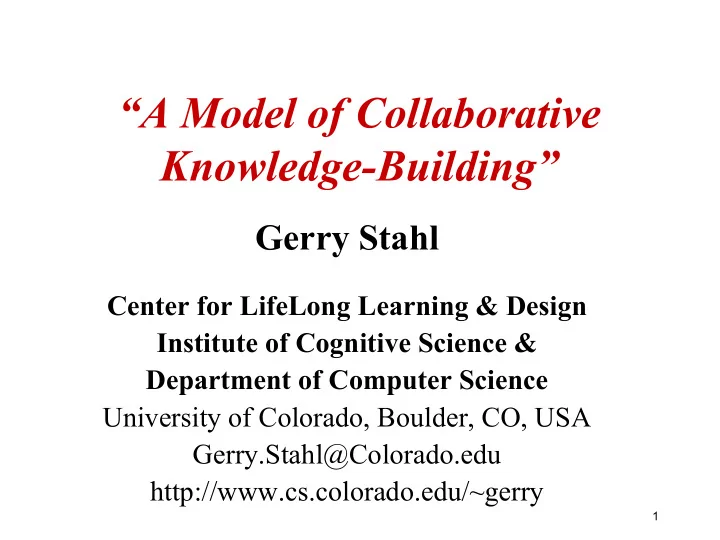

“A Model of Collaborative Knowledge-Building” Gerry Stahl Center for LifeLong Learning & Design Institute of Cognitive Science & Department of Computer Science University of Colorado, Boulder, CO, USA Gerry.Stahl@Colorado.edu http://www.cs.colorado.edu/~gerry 1
beyond discussion & chat collaborative knowledge-building goes beyond sharing personal opinions; it is a complex process within community contexts 2
communities support & restrict collaboration 3
a model of knowledge-building as a typical process of social activities interplay of individual cognition & social knowledge construction 4
cultural collaborative formalize artifacts knowledge & objectify use in negotiate activity perspectives shared personal understanding comprehension social explicate implications knowledge clarify building meanings accept as one's argumentation own personal & rationale under- standing discuss alternatives tacit pre- personal public other people's understanding belief statements public statements make articulate problematic in words 5
a model of knowledge-building as the mediation of individual & group activities artifacts in the world provide mediating resources 6
The The The mediation of social knowledge The The mediation of social knowledge The mediation of social knowledge The mediation of social knowledge The mediation of social knowledge mediation of social knowledge mediation of social knowledge mediation of social knowledge - - - - - - - - building building building building building building building building Personal perspective Personal understanding Mediating tools and Group understanding Synergistic group systems understanding Tacit understanding Tacit understanding Discussion: verbal Discussion: verbal Sharing perspectives Sharing perspectives of the social lived of the social lived statements & visual statements & visual world world cues cues Experiencing Experiencing Representations in Representations in Exchanging Exchanging breakdowns of breakdowns of communication communication arguments & arguments & understanding understanding media media rationale rationale Reinterpreting Reinterpreting Artifacts: physical, Artifacts: physical, Clarifying meanings Clarifying meanings meaning structures meaning structures symbolic, cultural symbolic, cultural Articulating one’s Articulating one’s Personal external Personal external Negotiating conflicts Negotiating conflicts understanding understanding memory devices memory devices Formally structuring Formally structuring Organizational Organizational Formally structuring Formally structuring knowledge knowledge memory systems memory systems knowledge knowledge 7
a model of knowledge-building as the use of resources by agents within social contexts the local technology, community and society define affordances 8
technology: confined by social practices, subject to negotiation 9
actors actors actors actors A community of practice Society An individual activities contributing to social knowledge activities contributing to social knowledge activities contributing to social knowledge- activities contributing to social knowledge - -building - building building building Group discussions Personal activities & understanding Exchange of Sharing Conducting actions in the world rationale & Experiencing perspectives argumentation breakdowns of Understanding things tacitly understanding (personal perspective) Negotiation of Clarification of Designing agreements & Reinterpreting meanings cultural Past Goals & disagreements meaning artifacts experience expectations structures Meaning structures Writing down Formally Externally Communicating shared representing storing Articulating one’s publicly understanding knowledge knowledge understanding Artifacts: the physical context Artifacts: the physical context Artifacts: the physical context Artifacts: the physical context Personal external Public Cultural Organizational memory devices statements artifacts memory systems the community’s cultural context the community’s cultural context the community’s cultural context the community’s cultural context Public statements Community Accepted Cultural Shared roles practices norms jargon the societal context the societal context the societal context the societal context Social Social Power Social Shared interests & rules relations language structures motivations 10
models of knowledge-building can provide a framework for software design & assessment what activities should collaboration software support beyond sharing personal opinions & information ? 11
some technology components of knowledge-building environments Knowledge-building Forms of computer Prototype systems activities support • A articulate in words discussion forum DynaClass B discuss alternatives personal & group WebGuide perspectives C argumentation & argumentation InfoMap rationale graph D clarify meanings interactive DynaGloss glossary E negotiate perspectives negotiation WebGuide support F formalize & objectify interactive DynaSource bibliography 12
WebGuide: supporting discussion, reflection, negotiation, knowledge management, in perspectives 13
14
representing perspectives: personal, small team, whole group support for discussion among perspectives, comparisons, negotiation, group knowledge management 15
knowledge-building as multiple perspectives interacting 16
web of perspectives: a flexible hierarchy of computational sharing among groups & individuals Gulch class perspective Student Mentor Environmental Landowner Mine owner Government P10 P11 Teacher P1 P2 P3 Blake P7 P8 P9 P12 P5 P6 Government Student Mentor Environ Mines Landowner comparison comp comp comp comp comp Gulch class comparison 17
future work: system building integration of computer support for discussion, perspectives, negotiation, bibliography, glossary, scaffolding, simulations, …. 18
future work: collaboration analysis & system evaluation micro-ethnographic analysis of videos of classrooms engaged in collaborative knowledge-building, with & without technology 19
for further information: Gerry.Stahl@colorado.edu http://www.cs.colorado.edu/~gerry/ publications/conferences/2000/ 20
Recommend
More recommend